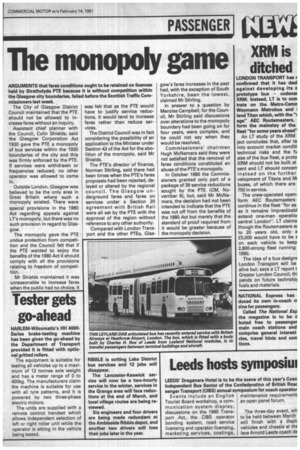The monopoly game
Page 25

If you've noticed an error in this article please click here to report it so we can fix it.
ARGUMENTS that fares conditions ought to be retained on licences held by Strathclyde PTE because it is without competition within the Glasgow city boundaries, failed before the Scottish Traffic Commissioners last week.
The City of Glasgow District Council maintained that the PTE should not be allowed to increase fares without an inquiry.
Assistant chief planner with the Council, Colin Shields, said the Glasgow Corporation Act 1930 gave the PTE a monopoly of bus services within the 1930 boundaries of the city and this was firmly enforced by the PTE. If services were withdrawn or frequencies reduced, no other operator was allowed to come in.
Outside London, Glasgow was believed to be the only area in Great Britain where such a monopoly existed. There were special provisions in the 1980 Act regarding appeals against LT's monopoly, but there was no such provision in regard to Glasgow.
The monopoly gave the PTE undue protection from competition and the Council felt that if the PTE wanted to enjoy the benefits of the 1980 Act it should comply with all the provisions relating to freedom of competition.
Mr Shields maintained it was unreasonable to increase fares when the public had no choice. It was felt that as the PTE would have to justify service reductions, it would tend to increase fares rather than reduce services.
The District Council was in fact considering the possibility of an application to the Minister under Section 43 of the Act for the abolition of the monopoly, said Mr Shields.
The PTE's director of finance, Norman Stirling, said there had been times when the PTE's fares proposals had been rejected, delayed or altered by the regional council. The Glasgow underground fares and fares on services under a Section 20 agreement with British Rail were all set by the PTE with the approval of the region without reference to any other authority.
Compared with London Transport and the other PTEs, Glas gow's fares increases in the past had, with the exception of South Yorkshire, been the lowest, claimed Mr Stirling.
In answer to a question by Menzies Campbell, for the Council, Mr Stirling said discussions over alterations to the monopoly boundary had been going on for four years, were complex, and he could not say when they would be resolved.
Commissioners' chairman Hugh McNamara said they were not satisfied that the removal of fares conditions constituted an abuse of the PTE's monopoly.
In October 1980 the Commissioners granted only part of a package of 39 service reductions sought by the PTE (CM, November 8), but, said Mr McNamara, the decision had not been intended to indicate that the PTE was cut off from the benefits of the 1980 Act but merely that the standard of proof required from it would be greater because of the monopoly decision.








































































































